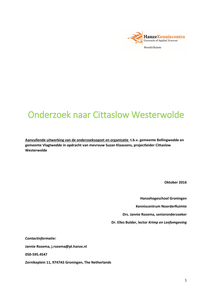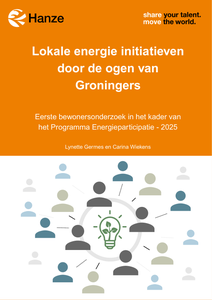Dit document is een onderzoeksvoorstel ten behoeve van de evaluatie van effecten van Cittaslow Westerwolde. Cittaslow is het internationale keurmerk dat de gemeenten Bellingwedde en Vlagtwedde in 2014 kregen toegekend. Dit onderzoeksvoorstel is geschreven in opdracht van beide Colleges van B&W en is vervolgens als zodanig voor deelonderzoeken 1 en 2 uitgevoerd in 2017.
DOCUMENT

Het evaluatieonderzoek van Cittaslow Westerwolde is gehouden in opdracht van de Colleges van B&W van de (inmiddels voormalige) gemeenten Bellingwedde en Vlagtwedde, nu: gemeente Westerwolde. Het evaluatieonderzoek richt zich op de externe communicatie met supporters van Cittaslow Westerwolde en op de initiatieven en samenwerking van deze supporters ten behoeve van Cittaslow. Het onderzoek is uitgevoerd als een kwantitatief onderzoek (survey) en kwalitatief onderzoek (diepte-interviews). De resultaten uit beide deelonderzoeken hebben geleid geleid tot aanbevelingen voor de communicatiestrategie en - activiteiten. Daarnaast zijn aanbevelingen gegeven over Cittaslow opgevat kan worden in het kader van programmasturing en samenwerking met supporters. Tenslotte zijn aanbevelingen gedaan over het evalueren van programma's, waarin de stakeholders betrokken zijn.
DOCUMENT

In 2014 hebben de gemeenten Bellingwedde en Vlagtwedde (provincie Groningen) het keurmerk Cittaslow toegekend gekregen. De ambities ten aanzien van Cittaslow Westerwolde hebben beide gemeenten vastgelegd in een visiedocument. Vanaf 2015 heeft de nadruk gelegen op het werven van supporters. In 2017 heeft een evaluatieonderzoek plaatsgevonden voor de effecten die Cittaslow Westerwolde heeft gehad onder en door de supporters. Geconcludeerd kon worden dat de supporters in voldoende mate zijn geinformeerd over Cittaslow, maar onvoldoende zicht hebben op wat de gemeenten in het kader van Cittaslow van hen verwachten. Initiatieven en onderlinge samenwerking zijn nauwelijks tot stand gekomen, waardoor ook effecten op sociaaleconomisch terrein nog niet aan te wijzen zijn. In het onderzoek zijn aanbevelingen gegeven om het concept Cittaslow binnen en buiten de gemeentelijke organisatie te verhelderen, zodat belanghebbenden duidelijker weten wat hun positie en rol is binnen Cittaslow Westerwolde.
DOCUMENT

Een begeleidende tekst voor de publicatie 'Westerwolde'; een foto-opdracht van de gemeentes Bellingwedde en Vlagtwedde aan studenten van Academie Minerva, Projectbureau/AMP. Mei 2015.
DOCUMENT

Bedrijfsleven • 3.000 mkb’ers in NoordNederland verenigd in meer dan 20 ondernemersverenigingen • de Gebiedscoöperaties Westerkwartier, Zuidwest-Drenthe, OostGroningen i.o. • de Stadgroninger Wijkcoöperatie Helpman/De Wijert Kennisinstellingen • Hanzehogeschool Groningen als vertegenwoordiger van hoger beroepsonderwijs en wetenschappelijk onderwijs in Noord-Nederland (Stenden, VHL, University of Groningen Centre of Entrepreneurship UGCE) • Innovatiewerkplaatsen / ReCoMa Lab • Entrance , Health Hub Roden, Cube 050 • Venture Lab North Overheden en maatsch. organisaties • Zorg-Innovatie-Forum ZIF • MKB-Noord, Staatsbosbeheer, LTO, VNO/NCW • Regio Groningen – Assen • Kans voor de Veenkoloniën • Healthy Ageing Netwerk Noord-Nederland • Gemeenten Groningen, Oldambt, Pekela, Stadskanaal, Veendam, Westerwolde, Marum, Leek, Grootegast, Zuidhorn, De Wolden, Meppel, Hoogeveen, Midden-Drenthe • Provincies Groningen, Drenthe en Fryslân. Nextworx is een programma van 10 miljoen euro
DOCUMENT

Perron 18 is een initiatief van Kunsteducatie Noorder Breed. Dit is een samenwerkingsverband van de kunsteducatieve bacheloropleidingen (Academie Minerva en Prins Claus Conservatorium), de Pedagogische Academie, het Lectoraat Kunsteducatie en de Master Kunsteducatie, een joint degree van de Hanzehogeschool Groningen en NHL Stenden Hogeschool. Dit verslag is gemaakt vanuit het lectoraat Kunsteducatie.
DOCUMENT

Met het Programma Energieparticipatie (PEP) streven de Groninger Energiekoepel, Grunneger Power en de Natuur- en Milieufederatie Groningen ernaar om een lokale energietransitie te creëren waarbij de bewoners van de provincie Groningen eigenaar zijn van en regie hebben over de energievoorziening. In het bewonersonderzoek (2024-2025), uitgevoerd door de Hanze Groningen, is onderzocht of bewoners betrokken zijn bij een LEI, of ze op de hoogte zijn van het bestaan van een LEI, en waarom bewoners wel of niet betrokken willen worden bij een LEI. In dit rapport worden de resultaten van het bewonersonderzoek beschreven. Op basis van de resultaten worden er aanbevelingen gedaan aan LEIs, zodat zij hun achterban kunnen vergroten. In de bijlage zijn de resultaten per gemeente weergegeven in infographics.
DOCUMENT

De wereld van werk is aan verandering onderhevig. Inwoners van de provincieGroningen stellen zich net als andere bewoners van ons land vragen over hoe hun leven, de opleiding van hun kinderen en hun werk en dat van hun kinderen er straks uit zal zien. Dát werk en opleidingen er over 20 jaar anders uitziet is zeker. Maar hoe? Dat weet niemand. Wat we wel weten is dat werk voor mensen een wezenlijk onderdeel van het leven is en blijft en van groot belang is voor hun zelfontplooiing, gezondheid en welbevinden. Wat we ook weten is dat de wereld steeds sneller verandert. Het is dus van belang dat de inwoners van Groningen zich goed kunnen voorbereiden op dat veranderende werk. Dat betekent dat zij in staat moeten zijn zich te blijven ontwikkelen en zich voortdurend aan te passen aan wat werkgevers en de samenleving van hen vragen. Maar ook wat hun directe omgeving van hen vraagt. Want niet alleen het werkverandert. Ook de persoonlijke situatie van mensen doet dat. De zorg en aandacht voor kinderen, ouders en anderen uit de persoonlijke omgeving vereisen een goede balans tussen werk en privé. Om in 2040 volwaardig mee te kunnen doen, moeten onze inwoners stevig in hun schoenen staan, zodat zij in staat zijn zich voortdurend aan te passen aan veranderende omstandigheden. Dat is goed voor henzelf, maar zorgt er ook voor dat (verschillende) werkgevers met hun tijd meekunnen. Overheden, onderwijs- en kennisinstellingen, bedrijven en werkgevers- en werknemersorganisaties hebben daarom een gezamenlijke taak om bij te dragen aan de beschikbaarheid en toegankelijkheid vanscholing, training en werk. Dat is niet alleen van belang voor bewoners, maar ook voor Noord-Nederland als geheel, waar een aantrekkelijke omgeving, een gezond leven en duurzame productie samenkomen.
DOCUMENT

The first two fases of the BUBO methode (Bottom Up Business Opportunities)
DOCUMENT
